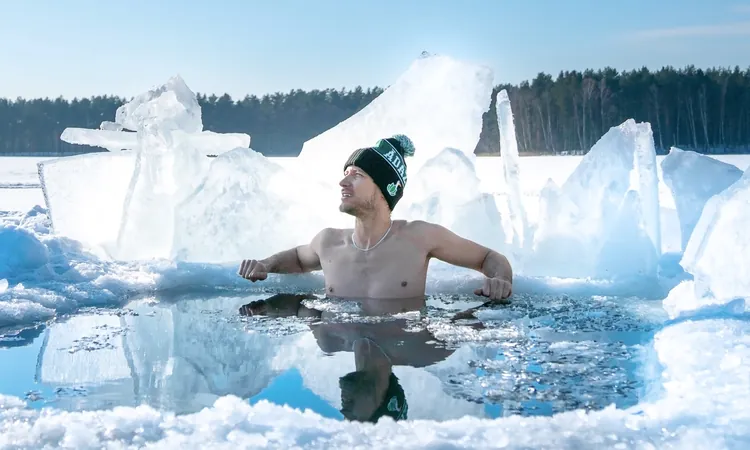
Cold Plunges Could Revolutionize Your Health: New Research Reveals Cellular Changes
2025-03-29
Author: Chun
Cold Water and Cellular Transformation in Just One Week
Researchers from the Human and Environmental Physiology Research Unit conducted a detailed experiment involving ten physically fit young men. Each participant took a daily plunge in water temperature set to 14°C (57.2°F) for one hour over seven days. Blood samples were collected before and after these immersion sessions on days one, four, and seven.
The focus wasn't on superficial measures like muscle soreness; instead, the research team analyzed peripheral blood mononuclear cells to assess cellular stress, recovery, and resilience, particularly emphasizing autophagy—the body's process of removing damaged cell components—and apoptosis, the programmed death of cells.
Professor Kenny stated, "Our findings indicate that repeated cold exposure significantly improves autophagic function, a critical cellular protective mechanism." This enhancement allows cells to better manage stress, hinting at promising implications for long-term health and longevity.
The Stress Response and Recovery Journey
Unexpectedly, on the first day of cold exposure, researchers observed signs of cellular stress, indicated by an increase in proteins like p62 and cleaved caspase-3, both markers associated with disrupted autophagy and impending cell death. This suggested that the initial cold exposure overwhelmed the cell's natural repair systems. However, by day four, subtle signs of adaptation became apparent, with increasing levels of LC3-II—an indicator of autophagic activity—and a decrease in p62, although recovery was not yet complete.
By day seven, significant changes emerged: LC3-II levels surged, indicating strong autophagic activity, while p62 dropped below baseline levels, and caspase-3 returned to near-normal levels, indicating that the cells had adapted well to the cold stimulus.
Exciting Findings from Ex Vivo Testing
To further investigate the impact of cold exposure, researchers conducted ex vivo tests. This allowed them to observe blood cells' abilities to handle cold stress outside the human body. The results were remarkable: post-acclimation, autophagic responses significantly improved across a range of cold conditions, confirming that the cellular changes were not just temporary but a lasting adaptation.
The Role of Heat Shock Proteins and Adaptation Mechanisms
In addition to autophagy and apoptosis, the study measured levels of heat shock proteins, like HSP70 and HSP90, which play a role in protein stability under stress. These proteins saw increased activity during cold exposure but did not escalate over the week, indicating the body's capacity to efficiently manage thermal stress.
Physiological metrics showcased the participants’ adaptations further. By the end of the week, reductions in blood lactate levels suggested less reliance on shivering to generate heat, signifying improved thermal efficiency.
Insights into Cellular Aging and the Future of Cold Exposure
An intriguing discovery was the response of cellular signals at extremely cold temperatures (33°C and below). Both autophagic and apoptotic markers rose, suggesting that although cold adaptation boosts cellular protection, it isn't an invincible shield against significant stress.
As Professor Kenny pointed out, "We were amazed to see how quickly the body adapted. Cold exposure might help prevent diseases and potentially even slow down aging at a cellular level." This study opens the door for further research into the benefits for older adults and individuals with chronic illnesses, underlining the potential of cold immersion as a health modality.
Cold Plunges as a Practical Health Habit
The findings strongly advocate for the inclusion of structured cold exposure in wellness regimens. In just seven days, this simple practice transformed how cells responded to stress and recovered from damage. While more studies are needed to establish specific guidelines—like the ideal temperature, duration, and frequency—the evidence suggests that carefully incorporated cold exposure could yield remarkable health benefits.
As the world continues to search for natural ways to enhance health and longevity, the answer may be hidden in a simple ice bath. Whether you're an athlete seeking an edge or an individual curious about healthspan, consider exploring the potential of cold plunges—the fountain of youth may just be a cold dive away!
Conclusion
This pioneering research has been published in the journal Advanced Biology. Stay tuned for more groundbreaking studies that could change our approach to health and wellness!





 Brasil (PT)
Brasil (PT)
 Canada (EN)
Canada (EN)
 Chile (ES)
Chile (ES)
 Česko (CS)
Česko (CS)
 대한민국 (KO)
대한민국 (KO)
 España (ES)
España (ES)
 France (FR)
France (FR)
 Hong Kong (EN)
Hong Kong (EN)
 Italia (IT)
Italia (IT)
 日本 (JA)
日本 (JA)
 Magyarország (HU)
Magyarország (HU)
 Norge (NO)
Norge (NO)
 Polska (PL)
Polska (PL)
 Schweiz (DE)
Schweiz (DE)
 Singapore (EN)
Singapore (EN)
 Sverige (SV)
Sverige (SV)
 Suomi (FI)
Suomi (FI)
 Türkiye (TR)
Türkiye (TR)
 الإمارات العربية المتحدة (AR)
الإمارات العربية المتحدة (AR)